- Clone
- MAR-1 (See other available formats)
- Regulatory Status
- RUO
- Other Names
- FceRIa, FceRI-α, high affinity IgE receptor
- Isotype
- Armenian Hamster IgG
- Ave. Rating
- Submit a Review
- Product Citations
- publications
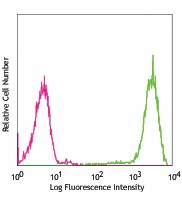
-

Mouse mast cell line MC/9 stained with biotinylated MAR-1, followed by Sav-PE
| Cat # | Size | Price | Save |
|---|---|---|---|
| 134303 | 50 µg | ¥20,680 | |
| 134304 | 500 µg | ¥73,700 |
FcεRIα is a transmembrane protein belonging to the Ig superfamily. FcεRIα forms a tetrameric complex with one β and two γ-subunits. The FcεRI complex plays an important role in triggering IgE-mediated allergic reactions. It is abundantly expressed on mast and basophils and up-regulated by the presence of IgE. Following stimulation via FcεRIα, mast cells and basophils release bioactive chemical mediators such as histamine, resulting in the initiation of allergic reactions. Cross linking of the high-affinity receptor for IgE on tissue mast cells triggers immediate hypersensitivity with local symptoms. The MAR-1 monoclonal antibody reacts with the FcεRIα subunit.
Product DetailsProduct Details
- Verified Reactivity
- Mouse
- Antibody Type
- Monoclonal
- Host Species
- Armenian Hamster
- Formulation
- Phosphate-buffered solution, pH 7.2, containing 0.09% sodium azide.
- Preparation
- The antibody was purified by affinity chromatography, and conjugated with biotin under optimal conditions.
- Concentration
- 0.5 mg/ml
- Storage & Handling
- The antibody solution should be stored undiluted between 2°C and 8°C. Do not freeze.
- Application
-
FC - Quality tested
- Recommended Usage
-
Each lot of this antibody is quality control tested by immunofluorescent staining with flow cytometric analysis. For flow cytometric staining, the suggested use of this reagent is ≤ 0.25 µg per million cells in 100 µl volume. It is recommended that the reagent be titrated for optimal performance for each application.
- Application Notes
-
Additional reported applications (for relevant formats of this clone) include: depletion2, immunohistochemistry of frozen sections (OCT embedded2).
-
Application References
(PubMed link indicates BioLegend citation) -
- Obata K, et al. 2007. Blood 110:913 (FC)
- Sokol CL, et al. 2008. Nat. Immunol. 9:310 (FC, Deplete, IHC)
- Chen J, et al. 2009. J. Biol. Chem.. 284:5763 (FC)
- Product Citations
-
- RRID
-
AB_1626100 (BioLegend Cat. No. 134303)
AB_1626106 (BioLegend Cat. No. 134304)
Antigen Details
- Structure
- A transmembrane protein of Ig super family member
- Distribution
-
Expressed on mast and basophils.
- Function
- Play an important role in triggering IgE-mediated allergic reactions.
- Ligand/Receptor
- IgE
- Cell Type
- Basophils, Mast cells
- Biology Area
- Immunology, Innate Immunity
- Molecular Family
- CD Molecules, Fc Receptors
- Antigen References
-
1. Arinobu Y, et al. 2005. P. Natl. Acad. Sci. USA 102:18105.
2. Yamaguchi M, et al. 2001. Int. Immunol. 13:843. - Gene ID
- 2205 View all products for this Gene ID
- UniProt
- View information about FcepsilonRIalpha on UniProt.org
Related Pages & Pathways
Pages
Related FAQs
- How many biotin molecules are per antibody structure?
- We don't routinely measure the number of biotins with our antibody products but the number of biotin molecules range from 3-6 molecules per antibody.
Other Formats
View All FcεRIα Reagents Request Custom Conjugation| Description | Clone | Applications |
|---|---|---|
| Purified anti-mouse FcεRIα | MAR-1 | FC,IHC-F |
| Biotin anti-mouse FcεRIα | MAR-1 | FC |
| FITC anti-mouse FcεRIα | MAR-1 | FC |
| PE anti-mouse FcεRIα | MAR-1 | FC |
| Alexa Fluor® 647 anti-mouse FcεRIα | MAR-1 | FC |
| Pacific Blue™ anti-mouse FcεRIα | MAR-1 | FC |
| APC anti-mouse FcεRIα | MAR-1 | FC |
| PE/Cyanine7 anti-mouse FcεRIα | MAR-1 | FC |
| PerCP/Cyanine5.5 anti-mouse FcεRIα | MAR-1 | FC |
| Purified anti-mouse FcεRIα (Maxpar® Ready) | MAR-1 | FC,CyTOF® |
| Alexa Fluor® 700 anti-mouse FcεRIα | MAR-1 | FC |
| APC/Cyanine7 anti-mouse FcεRIα | MAR-1 | FC |
| PE/Dazzle™ 594 anti-mouse FcεRIα | MAR-1 | FC |
| Alexa Fluor® 488 anti-mouse FcεRIα | MAR-1 | FC |
| Brilliant Violet 510™ anti-mouse FcεRIα | MAR-1 | FC |
| TotalSeq™-A0115 anti-mouse FcεRIα | MAR-1 | PG |
| Ultra-LEAF™ Purified anti-mouse FcεRIα | MAR-1 | FC,IHC-F |
| TotalSeq™-C0115 anti-mouse FcεRIα | MAR-1 | PG |
| TotalSeq™-B0115 anti-mouse FcεRIα | MAR-1 | PG |
| APC/Fire™ 750 anti-mouse FcεRIα | MAR-1 | FC |
Customers Also Purchased
Compare Data Across All Formats
This data display is provided for general comparisons between formats.
Your actual data may vary due to variations in samples, target cells, instruments and their settings, staining conditions, and other factors.
If you need assistance with selecting the best format contact our expert technical support team.
-
Purified anti-mouse FcεRIα
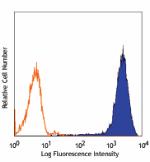
Mouse mast cell line MC/9 stained with purified MAR-1 conjug... -
Biotin anti-mouse FcεRIα
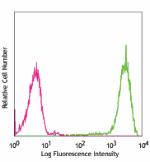
Mouse mast cell line MC/9 stained with biotinylated MAR-1, f... -
FITC anti-mouse FcεRIα
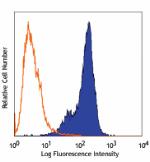
Mouse mast cell line MC/9 stained with MAR-1 FITC -
PE anti-mouse FcεRIα

Mouse mast cell line MC/9 stained with MAR-1 PE -
Alexa Fluor® 647 anti-mouse FcεRIα
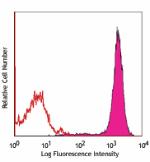
Mouse mast cell line MC/9 stained with MAR-1 Alexa Fluor®... -
Pacific Blue™ anti-mouse FcεRIα
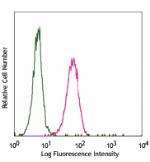
Mouse mast cell line MC/9 stained with anti-mouse Fc&epsilon... -
APC anti-mouse FcεRIα
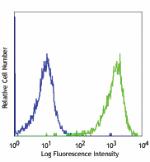
Mouse mast cell line MC/9 stained with MAR-1 APC -
PE/Cyanine7 anti-mouse FcεRIα
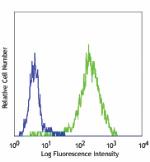
Mouse mast cell line MC/9 stained with MAR-1 PE/Cyanine7 -
PerCP/Cyanine5.5 anti-mouse FcεRIα
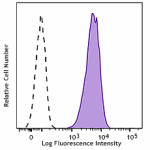
Mouse mast cell line MC/9 was stained with FceRIa (clone MAR... -
Purified anti-mouse FcεRIα (Maxpar® Ready)
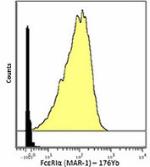
MC/9 (top) or NMuMG (bottom) mouse cell lines stained with 1... -
Alexa Fluor® 700 anti-mouse FcεRIα
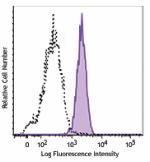
Mouse mast cell line MC/9 was stained with FcεRI&alp... -
APC/Cyanine7 anti-mouse FcεRIα
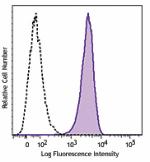
Mouse mast cell line MC/9 was stained with FcεRI&alp... -
PE/Dazzle™ 594 anti-mouse FcεRIα
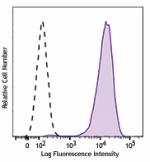
Mouse mast cell line MC/9 was stained with FcεRIα (clone MAR... -
Alexa Fluor® 488 anti-mouse FcεRIα
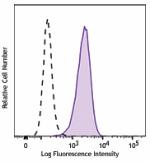
Mouse mast cell line MC/9 was stained with FcεRIα (clone MAR... -
Brilliant Violet 510™ anti-mouse FcεRIα
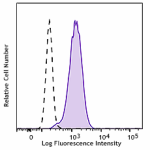
Mouse mast cell line MC/9 was stained with FcεRIα (clone MAR... -
TotalSeq™-A0115 anti-mouse FcεRIα
-
Ultra-LEAF™ Purified anti-mouse FcεRIα

Mouse mast cell line MC/9 stained with purified MAR-1 conjug... -
TotalSeq™-C0115 anti-mouse FcεRIα
-
TotalSeq™-B0115 anti-mouse FcεRIα
-
APC/Fire™ 750 anti-mouse FcεRIα
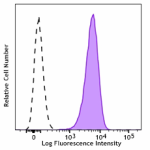
Mouse mast cell line MC/9 was stained with FcεRIα (clone MAR...






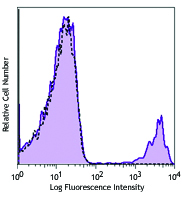
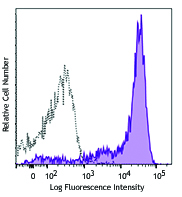
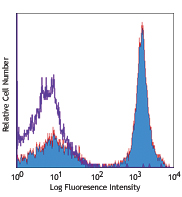
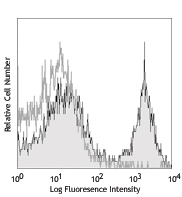



Follow Us